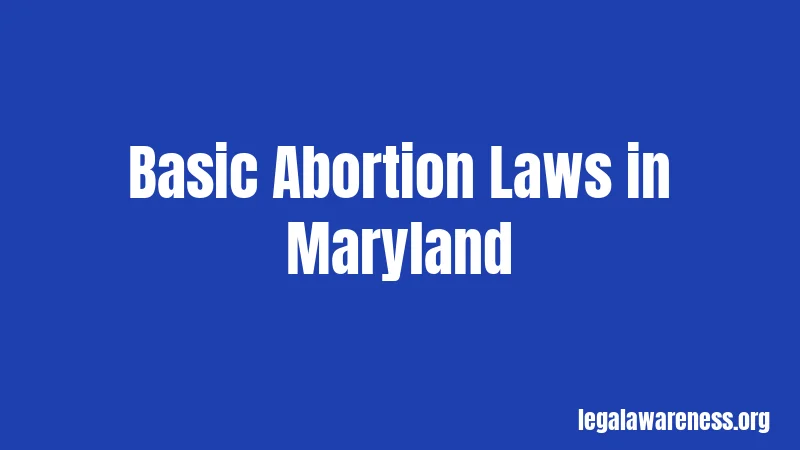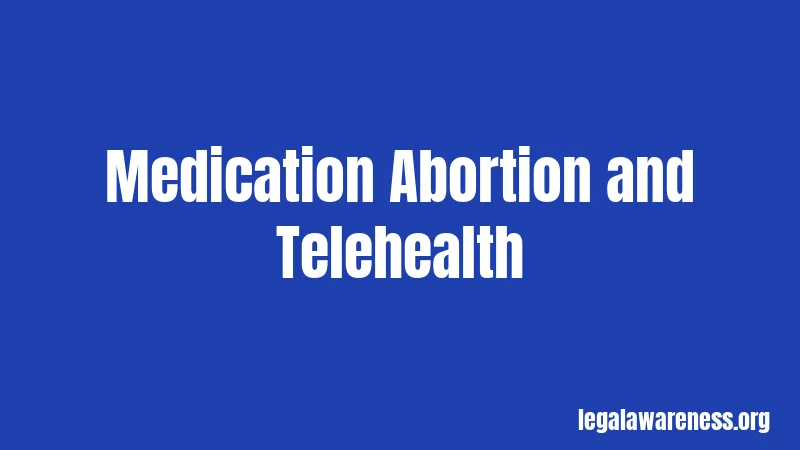Abortion Laws in Maryland (2026): Your Complete Rights Explained
Most people don’t realize just how protected abortion rights are in Maryland. Seriously. This state has some of the strongest protections in the entire country. And after voters overwhelmingly approved a constitutional amendment in 2024, those protections got even stronger.
Whether you’re a Maryland resident or thinking about traveling here for care, you need to know what the law actually says. Let’s break it down step by step.
What Makes Maryland Different?

Here’s the deal. Maryland doesn’t restrict abortion based on how far along you are in pregnancy. Before fetal viability, you can get an abortion for any reason. No questions asked. No waiting periods. No mandatory counseling sessions.
That’s pretty unusual compared to most states. Many places have strict cutoffs at 6, 12, or 15 weeks. Maryland doesn’t work that way.
Viability is when a fetus could survive outside the womb. Medical experts generally place this around 24 to 26 weeks. But the exact timing depends on each individual case. Doctors make this determination based on their medical judgment.
The 2024 Constitutional Amendment
Okay, pause. This part is important.
In November 2024, Maryland voters made history. They approved Question 1 with about 76% support. That’s more than three-quarters of voters saying yes to protecting reproductive freedom.
The amendment added new language to Maryland’s Declaration of Rights. It says every person has a fundamental right to reproductive freedom. This includes the ability to prevent, continue, or end a pregnancy.
What does this mean for you? The state can’t deny or burden this right unless it has a compelling reason. And even then, it must use the least restrictive way possible.
Before this amendment, abortion was protected by state law. Now it’s protected by the state constitution. That’s a much harder thing to change. A future legislature can’t just vote to take it away.
Basic Abortion Laws in Maryland

When Abortion Is Legal
You can get an abortion in Maryland at any point before viability. Most people think of this as roughly the first two trimesters. After viability, abortion is still legal in certain situations.
Those situations include when continuing the pregnancy would endanger the pregnant person’s life or health. Abortion is also legal after viability if the fetus has a genetic defect or serious abnormality.
Wondering who decides if these exceptions apply? The doctor does. They use their professional medical judgment. Two providers may need to certify in writing that the procedure is necessary.
No Waiting Periods or Mandatory Counseling
A friend asked me about this recently. She was surprised to learn Maryland has no mandatory waiting period. In many states, you have to wait 24 or even 72 hours between counseling and the procedure.
Not in Maryland. If you’re ready, you can have your appointment without forced delays.
There’s also no required state-mandated counseling. No one will make you look at ultrasound images. No one will read you a script designed to change your mind. Your provider will give you medical information you need. But the state doesn’t dictate the content.
Who Can Provide Abortion Care
Maryland expanded who can perform abortions through the Abortion Care Access Act of 2022. Before this law, only doctors could provide this care.
Now several types of healthcare providers can perform abortions. This includes nurse practitioners, certified nurse midwives, and physician assistants. They must be licensed by the state. And abortion must fall within their scope of practice.
Honestly, this is one of the most important changes in recent years. It means more people can get care from more providers. That’s especially helpful in rural areas where doctors are scarce.
Parental Notification for Minors
If you’re under 18, there’s one extra step. Maryland law requires that a parent or guardian be notified before your abortion. Notice that it says notified, not consent. Your parent doesn’t have to agree. They just need to know.
But wait. There are several exceptions. A provider can skip notification if, in their professional judgment, any of these apply:
You are mature and capable of giving informed consent. Notification would not be in your best interest. Notice might lead to physical or emotional abuse. You don’t live with your parent or guardian. Reasonable efforts to give notice have failed.
Providers have broad discretion here. Many teens qualify for these exceptions. And there’s no judicial bypass process you have to navigate. The doctor makes the determination.
If you decide not to have the abortion after all, the provider cannot tell your parents about your earlier plans.
Medication Abortion and Telehealth

Getting the Abortion Pill
Medication abortion uses two FDA-approved drugs. The first is mifepristone. The second is misoprostol. Together, they safely end an early pregnancy.
You can use medication abortion up to about 10 to 12 weeks from your last period. Different providers have slightly different cutoffs. Some go up to 11 weeks. Others up to 12 weeks.
Here’s what makes Maryland convenient. You can get abortion pills through telehealth. No in-person visit required. You have a video appointment with a provider. If you qualify, they mail the medication to your Maryland address.
Pretty straightforward, right?
How Telehealth Works
The process goes something like this. You schedule a telehealth visit. You’ll answer questions about your medical history and pregnancy. A licensed provider reviews your information during a video call.
If they determine you’re eligible, they send the prescription to a pharmacy. The medication arrives in discreet packaging. You take the pills at home following the instructions.
Many providers offer text or phone support during and after. You’re not alone in this process.
Insurance and Costs
What Insurance Covers
Maryland Medicaid covers abortion services. This has been true for a while. But as of November 2024, coverage expanded to all pregnant individuals on the family planning benefit program.
Private insurance plans that cover labor and delivery must also cover abortion. So if your plan covers childbirth, it should cover abortion too.
Some telehealth providers accept specific insurance plans. Aetna, Cigna, and some others may work. Call ahead to check your coverage.
Costs Without Insurance
Don’t have insurance? You’re not alone. This confuses a lot of people.
Medication abortion through telehealth typically costs between $150 and $600. The exact amount depends on the provider. Some offer sliding scale fees based on income.
In-clinic abortions cost more, especially later in pregnancy. First trimester surgical procedures might range from $500 to $800. Second trimester procedures are more expensive.
Financial Help Is Available
Cost should never stop you from getting care. There are abortion funds that can help.
The Baltimore Abortion Fund assists people seeking care in Maryland. The National Abortion Federation has a hotline that connects people with funding. Many clinics work with local and national funds.
In 2025, Maryland created the Public Health Abortion Grant Program. This uses about $25 million in unused insurance premiums to help uninsured and underinsured patients. Providers can get reimbursed for care given to people who can’t pay full price.
Protections for Patients and Providers
Shield Laws
Maryland passed shield laws in 2023. These protect providers, patients, and people who help others access abortion.
What does this mean? If another state has an abortion ban, Maryland won’t cooperate with their investigations. Providers won’t lose their licenses for helping out-of-state patients.
This matters because many people travel to Maryland from nearby states with restrictions. You’re not alone, this is more common than you think.
Privacy Protections
Maryland law protects your health data privacy. Companies can’t share or sell your health information without consent.
Electronic health records get extra protection. This reduces legal risk for people traveling from other states for care.
Clinic access is protected too. It’s illegal to interfere with people entering or exiting abortion facilities.
How to Find a Provider
In-Person Clinics
Maryland has about 27 abortion clinics across the state. You’ll find them in Baltimore, College Park, Rockville, Chevy Chase, Hagerstown, and other locations.
Planned Parenthood operates several health centers. Other options include Potomac Family Planning Center, Partners in Abortion Care, and Gynemed Surgical Center. University of Maryland also provides abortion services through its reproductive health program.
Some clinics specialize in later procedures. CARE Reproductive Health in Chevy Chase offers care up to 35 weeks in certain situations.
Online Resources
Abortion Finder has a searchable directory of verified providers. Plan C provides information about online pill options. I-Need-An-A has a state-by-state guide.
Be careful when searching online. Some websites look like clinics but are actually crisis pregnancy centers. These organizations don’t provide abortions. They often try to discourage people from getting one.
Real abortion clinics will clearly state they provide abortions. They’ll list prices. They won’t ask you to come in just to talk about your options.
What Happens During an Abortion
Medication Abortion
With the pill method, you take mifepristone first. This blocks the hormone that maintains pregnancy. Then you take misoprostol 24 to 48 hours later. This causes cramping and bleeding.
Most people complete the process within a few hours. It feels like a heavy period with strong cramps. Some people have nausea or flu-like symptoms.
You’ll need thick pads. A heating pad helps with cramps. Pain medication can make you more comfortable. Providers usually include anti-nausea medicine with your prescription.
In-Clinic Abortion
Procedural abortions happen at a clinic or medical office. First trimester procedures usually take 5 to 10 minutes. You can choose local or general anesthesia.
With local anesthesia, you’re awake but numb. You might feel pressure or cramping. With general anesthesia, you sleep through the procedure.
Recovery takes a few hours. Most people go home the same day. Light bleeding and cramping are normal afterward.
Special Circumstances
Out-of-State Patients
If you live in a state with abortion restrictions, you can travel to Maryland. Maryland providers serve patients from all over the country.
Shield laws protect providers who serve out-of-state patients. Your home state can’t prosecute Maryland doctors for helping you.
Some clinics offer support with travel and lodging. Abortion funds may help cover these costs too.
College Students
Public colleges and universities in Maryland must have a plan to provide or refer students for reproductive health services. This includes abortion.
This requirement started in August 2024. It means campus health centers should be able to point you toward resources even if they don’t provide abortions directly.
Fetal Abnormalities
If your pregnancy has a serious genetic condition or abnormality, abortion is legal even after viability. This can be a devastating situation. Providers who specialize in these cases offer compassionate care.
You don’t need to justify your decision. Medical professionals understand that families face difficult choices.
Frequently Asked Questions
Is abortion legal in Maryland at any point during pregnancy? Before fetal viability, yes. After viability, abortion is legal only if the pregnant person’s life or health is endangered, or if there’s a serious fetal abnormality.
Do I need my parent’s permission if I’m under 18? No permission needed, just notification. And providers can waive even that requirement in several situations, including if you’re mature enough to consent independently.
Can I get abortion pills by mail in Maryland? Yes. Telehealth providers can prescribe abortion medication and mail it to any Maryland address.
Does Maryland Medicaid cover abortion? Yes. Maryland uses state funds to cover abortion services through Medicaid.
Can I travel to Maryland from another state for an abortion? Absolutely. Maryland’s shield laws protect providers who serve out-of-state patients.
Final Thoughts
Maryland stands out as one of the most protective states for abortion rights in the country. The 2024 constitutional amendment made these protections even stronger. Whether you’re a resident or traveling from elsewhere, you have options.
If you need care, don’t wait. Reach out to a provider, check your insurance, and explore financial assistance if cost is a barrier. Your reproductive decisions are protected here.
Now you know the basics. Stay informed, take care of yourself, and when in doubt, reach out to a healthcare provider who can answer your specific questions.
References
- Center for Reproductive Rights. “Maryland Abortion Laws.” https://reproductiverights.org/maps/abortion-laws-by-state/maryland/
- Maryland General Assembly. “Maryland Code, Health-General Article, Title 20.” https://mgaleg.maryland.gov
- Ballotpedia. “Maryland Question 1, Right to Reproductive Freedom Amendment (2024).” https://ballotpedia.org/Maryland_Question_1,Right_to_Reproductive_Freedom_Amendment(2024)
- Planned Parenthood of Maryland. “Maryland Minor Laws.” https://www.plannedparenthood.org/planned-parenthood-maryland/client-resources/maryland-minor-laws
- University of Maryland MARCH Program. “An Overview of Maryland Abortion Law.” https://umaryland.pressbooks.pub/march/chapter/overview-maryland-abortion-law/
- Maryland Department of Health. “Abortion Care Clinical Training Program.” https://health.maryland.gov
- NPR. “Abortion will be protected in the Maryland state constitution.” November 2024. https://www.npr.org/2024/11/05/g-s1-32723/abortion-will-be-protected-in-the-maryland-state-constitution
